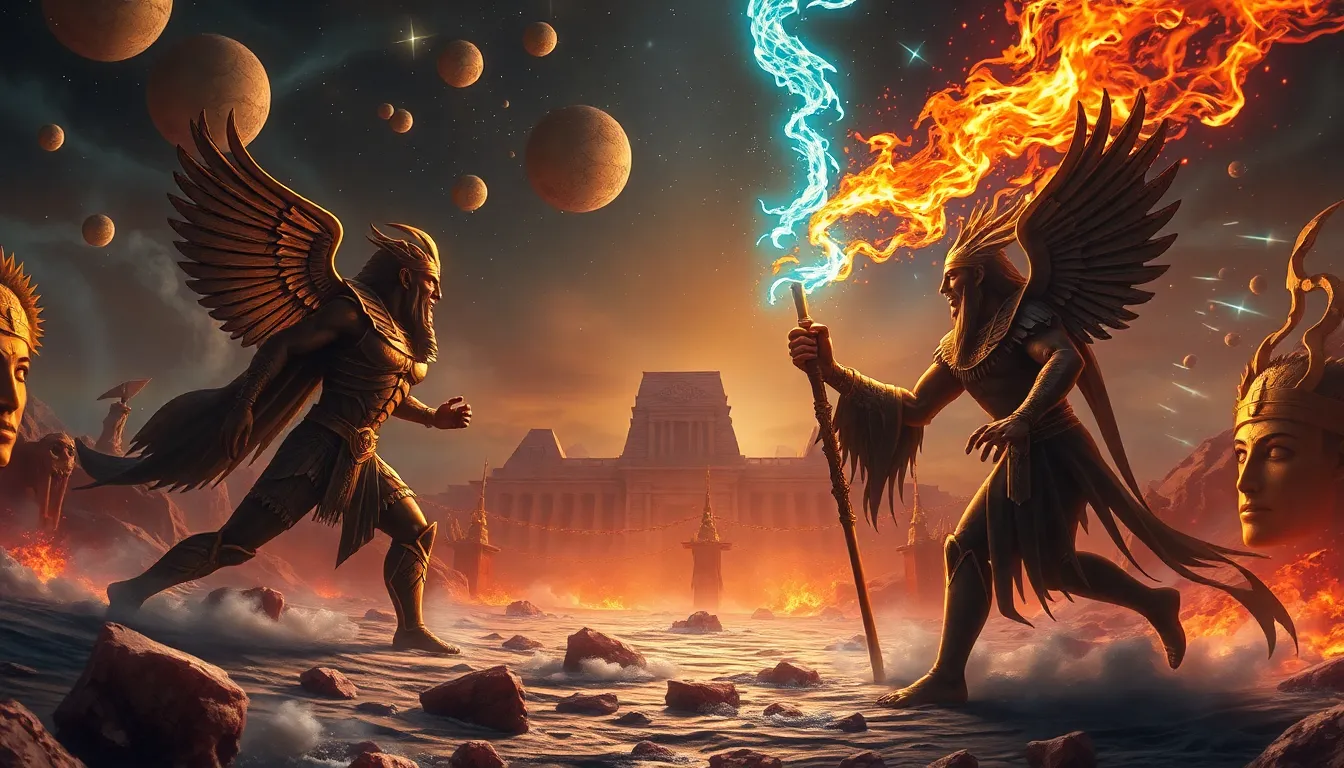The Myth of the Cosmic Battle: Order vs. Chaos
I. Introduction
In the vast tapestry of human thought, the concepts of order and chaos represent fundamental dualities that have shaped our understanding of the universe. Order is often associated with structure, predictability, and harmony, while chaos embodies randomness, disorder, and unpredictability. This dichotomy is not merely philosophical; it has profound implications in various fields, including mythology, psychology, and science.
The cosmic battle myth encapsulates the struggle between these two forces, illustrating the ongoing tension and interaction that defines existence. Throughout history, different cultures have portrayed this battle in diverse ways, providing a rich narrative that reflects human experience and understanding. This article aims to explore the origins, implications, and realities of the order-chaos myth, shedding light on its significance in contemporary society.
II. Historical Perspectives on Order and Chaos
Ancient civilizations have long grappled with the concepts of order and chaos, each developing unique cosmologies to explain their existence. For instance:
- Babylonian Cosmology: The Enuma Elish epic depicts the god Marduk’s battle against the chaotic sea goddess Tiamat, symbolizing the triumph of order over chaos.
- Greek Mythology: The primordial deities, such as Chaos and Gaia, illustrate the emergence of order from a state of formlessness.
- Chinese Philosophy: The concept of Yin and Yang represents the balance of opposing forces, where order and chaos coexist in harmony.
Over time, the order-chaos dichotomy has evolved, reflecting changes in societal values and belief systems. Mythology and religion have played crucial roles in shaping these perceptions, often serving as tools for understanding the natural world and human experience.
III. Psychological Interpretations of Order vs. Chaos
From a psychological perspective, the battle between order and chaos can be interpreted through various lenses. One significant framework is Jungian psychology, which posits that the journey of the hero often involves confronting the chaotic aspects of the psyche:
- Jungian Archetypes: The hero’s journey is a metaphor for the internal struggle between the known (order) and the unknown (chaos).
- Cognitive Biases: Our understanding of order and chaos is influenced by cognitive biases that shape our perception of events and experiences.
- Psychological Need for Structure: In a chaotic world, individuals often seek out order as a means of coping with uncertainty and anxiety.
These psychological interpretations highlight the intrinsic human desire to find meaning and stability amid chaos, emphasizing the importance of narratives that provide a sense of order.
IV. Scientific Insights into Order and Chaos
Scientific explorations of order and chaos reveal complex relationships that challenge traditional notions. One key area of study is chaos theory, which examines how systems can be both deterministic and unpredictable:
- Chaos Theory: This field helps us understand how complex systems can exhibit chaotic behavior while still adhering to underlying rules.
- Entropy: The concept of entropy in thermodynamics illustrates the tendency of systems to move towards disorder, raising questions about the universe’s ultimate fate.
- Order from Chaos: Examples in physics and biology, such as the formation of snowflakes and the emergence of life, demonstrate how order can arise from chaotic conditions.
These scientific insights challenge the binary view of order and chaos, suggesting a more nuanced relationship between the two forces.
V. The Sociocultural Impact of the Order-Chaos Narrative
The myth of the cosmic battle has significantly influenced sociocultural dynamics throughout history:
- Power Dynamics: Societies have often used the order-chaos narrative to justify power structures, portraying leaders as champions of order against chaotic forces.
- Literature and Film: The cosmic battle is a prevalent theme in storytelling, with countless narratives exploring the tension between order and chaos.
- Modern Movements: The implications of this myth extend to contemporary political and social movements, where struggles for order and justice are often framed through the lens of chaos.
This sociocultural impact underscores the relevance of the order-chaos narrative in shaping collective identities and values.
VI. Deconstructing the Myth: Alternative Frameworks
While the order-chaos dichotomy has dominated thought, alternative frameworks offer fresh perspectives:
- Non-binary Approaches: Understanding the cosmos as a spectrum rather than a binary allows for more comprehensive interpretations.
- Synergy: The coexistence of order and chaos can be seen as a dynamic interplay, where both forces contribute to the complexity of existence.
- Philosophical Perspectives: Various philosophical traditions emphasize balance and dualism, advocating for a holistic understanding of reality.
These alternative frameworks encourage a reevaluation of the traditional order-chaos narrative, opening the door to new insights and understandings.
VII. The Future of the Order vs. Chaos Debate
As we look to the future, emerging scientific theories and cultural shifts may reshape the order-chaos debate:
- Emerging Theories: Advances in science, particularly in quantum mechanics and systems theory, challenge existing narratives about order and chaos.
- New Narratives: Spirituality and philosophy are evolving, moving towards narratives that embrace complexity and interconnectedness.
- Technology and Innovation: The role of technology in understanding and navigating chaos may redefine our perspectives on order.
These developments suggest a potential shift toward embracing the complexity of the universe rather than adhering to simplistic binaries.
VIII. Conclusion
In summary, the myth of the cosmic battle between order and chaos is a multifaceted narrative that has shaped human thought across cultures and epochs. By exploring historical perspectives, psychological interpretations, scientific insights, and sociocultural impacts, we gain a deeper understanding of this enduring myth.
As contemporary society grapples with challenges that often defy simplistic explanations, reevaluating the order-chaos narrative becomes imperative. Embracing the complexities of the universe beyond simple binaries allows for a richer understanding of existence and our place within it.
We encourage readers to explore these themes further, engaging with the intricacies of order and chaos in their own lives and the broader universe.




